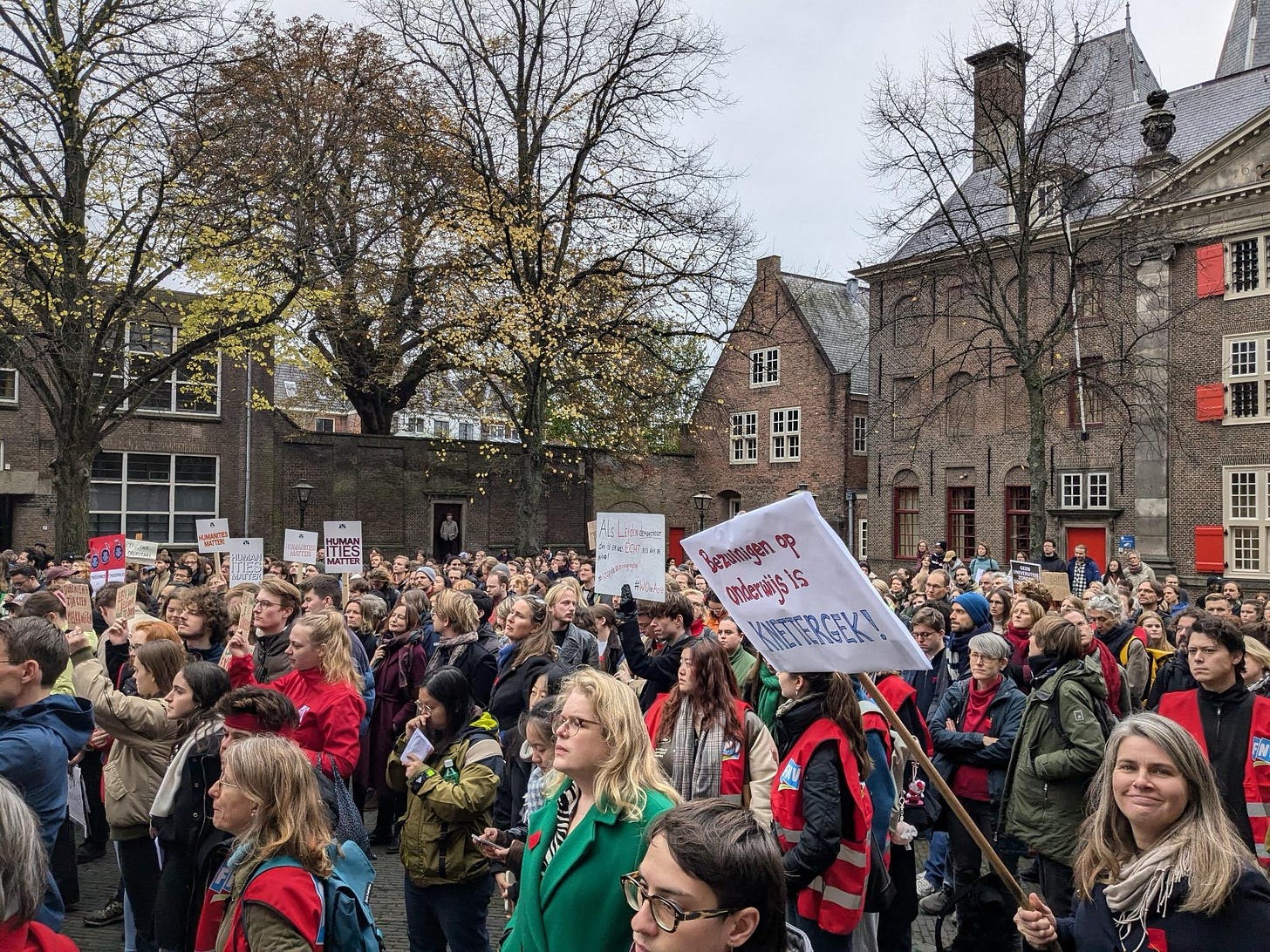Dutch university staff and students demonstrate against budget cuts despite de facto ban

Edit: WOinActie has announced a new demonstration against the cuts to be held on the 25th of November.
Today, university staff and students are taking to the streets across the Netherlands to protest against the Dutch far-right government’s plans to cut the higher-education budget by €1 billion.
Originally, the university staff movement WOinActie (higher-education in action), alongside labour unions FNV and AOb, had organised a single large demonstration to take place in the city of Utrecht. However, this was de facto banned by the mayor and police of the city.
Yesterday, the organizers were told by the city mayor and police that the demonstration could not take place because of supposed inside information that the demonstration would be “hijacked” and that there was a risk of violence. The police did not reveal details about the contents of this inside information.
In response, the Dutch labour union confederation FNV and the education union AOb cancelled the demonstration in Utrecht citing the de facto ban. Later, the Dutch public broadcaster NOS reported that this group that the police claimed were allegedly planning on “hijacking” the protest consisted of pro-Palestinian protesters.
Demonstrations continue despite the de facto ban
Despite the de facto ban on the demonstration planned in Utrecht, students and staff are demonstrating across the country today with working stops, a speaking programme in parliament, and other actions planned.
The National Students Union of the Netherlands (LSVB) said that they had not received any clarity on what the alleged risks of violence were that the Mayor and police of Utrecht used as justification to block the demonstration. They also provided information on how protesters could stay safe and defend their right to protest.
Yesterday, WOinActie released a public statement saying:
Due to a de facto ban from the Utrecht mayor because the safety of the demonstration could not be guaranteed, the demonstration in Utrecht was not possible. There will be a new call for a large demonstration in The Hague that will take place before the education budget is discussed. Postponement does not mean abandonment. No matter what, we will stand up together against these cuts in higher education.
Tomorrow, the original speakers' program will continue from the heart of democracy: the Parliament. This program can be followed from 1:30 p.m. via a livestream. Colleagues and students will gather and interrupt work for this purpose. After the livestream, there will be local actions, including walk-outs, in several places.
We will not let ourselves be played apart and continue the fight against the barrenness of higher education unabated.
The far-right government is attempting to slash public spending for universities and impose a fine of €3000 for students who take longer than expected to complete degrees. The Dutch national research organisation states that the cuts could jeopardize the country’s position in international research and innovation.
The cuts represent the hostility of the Dutch government’s position towards academia and higher education.
A livestream of the programmed talks in Parliament is available here.
Demonizing protesters and the Dutch Arab community
The past weeks have seen an escalation in the Dutch right-wing government’s anti-migrant and Islamophobic discourse. Amsterdam has been the centre of a global media firestorm after violence erupted when Israeli football fans took to the streets assaulting a Muslim taxi driver, ripping Palestinian flags from buildings, and chanting slogans such as “there are no schools in Gaza, as there are no children left” and “olé, olé, let the IDF win, we will fuck the Arabs.”
Videos showed the Israeli fans arming themselves with pipes, wooden planks, and stones while walking through the streets of the capital.
After the football match between Maccabi Tel Aviv and Ajax, there were reports of groups of individuals attacking the Israeli supporters on the street. Amsterdam Mayor Femke Halsema said that there were telegram groups in which members discussed going on a “Jew hunt.” In the end, 62 people have been detained and 5 individuals were hospitalized in the aftermath of the clashes.
The Israeli state flew the supporters back to Israel where, upon arrival, they were again seen chanting the same genocidal and racist chants as they had done in Amsterdam.
Dutch right-wing politicians have capitalized on the situation by escalating their right-wing anti-migrant and Islamophobic discourse. The political debate in the country has focused almost entirely on the violence against the Israeli fans while ignoring the racist chants, defacement of property, assaults, and threatening behaviour towards pro-Palestinian Dutch residents.
Far-right Islamophobic leader of the PVV, Geert Wilders, has alleged that “Moroccans are to blame” for the violence and is calling for deportations of dual Dutch-Moroccan citizens who have been convicted of involvement.
Now, it appears that this political demonization of the Dutch pro-Palestinian community is being weaponized to sow division between the demonstrators against education cuts and those calling for an end to the genocide in Gaza. By alleging that pro-Palestinian protesters intended to “hijack” the demonstrations against education cuts, it appears that Dutch authorities are attempting to break solidarity between the two groups of mobilisations.
A spokesperson from the young-socialist organisation ROOD, who was assisting in the country-wide mobilisations, told news channel RTV Utrecht that it does not expect there to be disturbances from pro-Palestinian protesters since ROOD also understands and empathizes with what they are fighting for.
The national student union (LSVB) released the following statement (translated from Dutch):
This cancellation [of the demonstration in Utrecht] confirms that the Netherlands finds itself in a severe, anti-democratic storm wherein it is no longer possible to demonstrate for even fundamental things such as higher education. It is now more important than ever that demonstrations are not criminalized, that fundamental rights of citizens are defended, and that the right to protest is protected. That this currently isn’t happening is an incredibly bad sign. Vigilance is needed.



